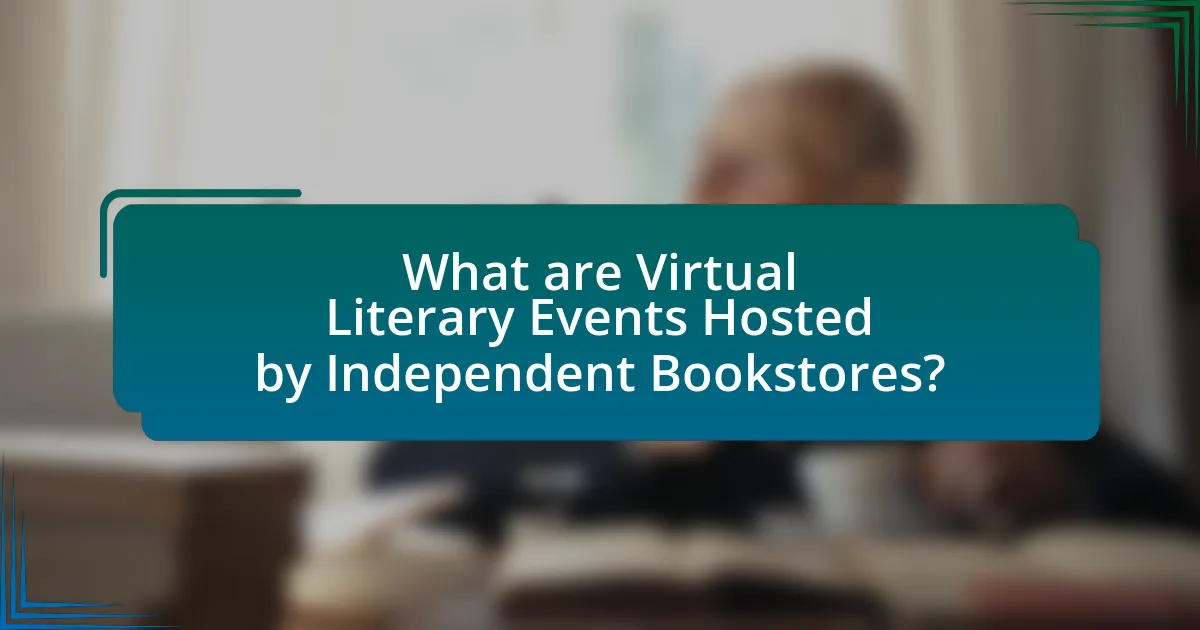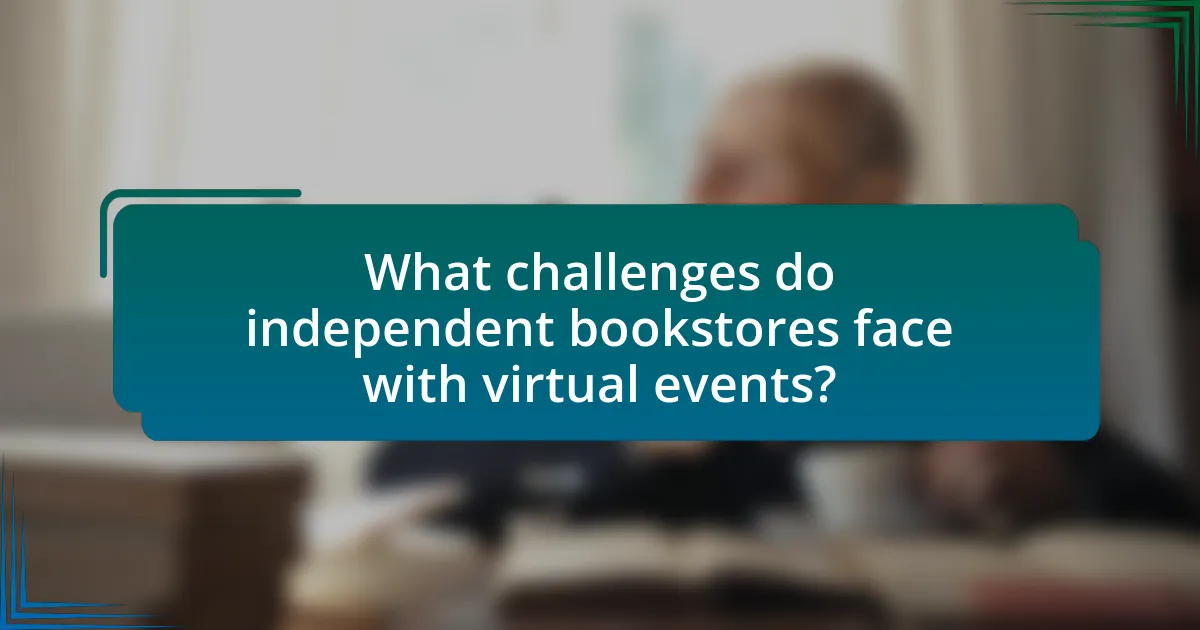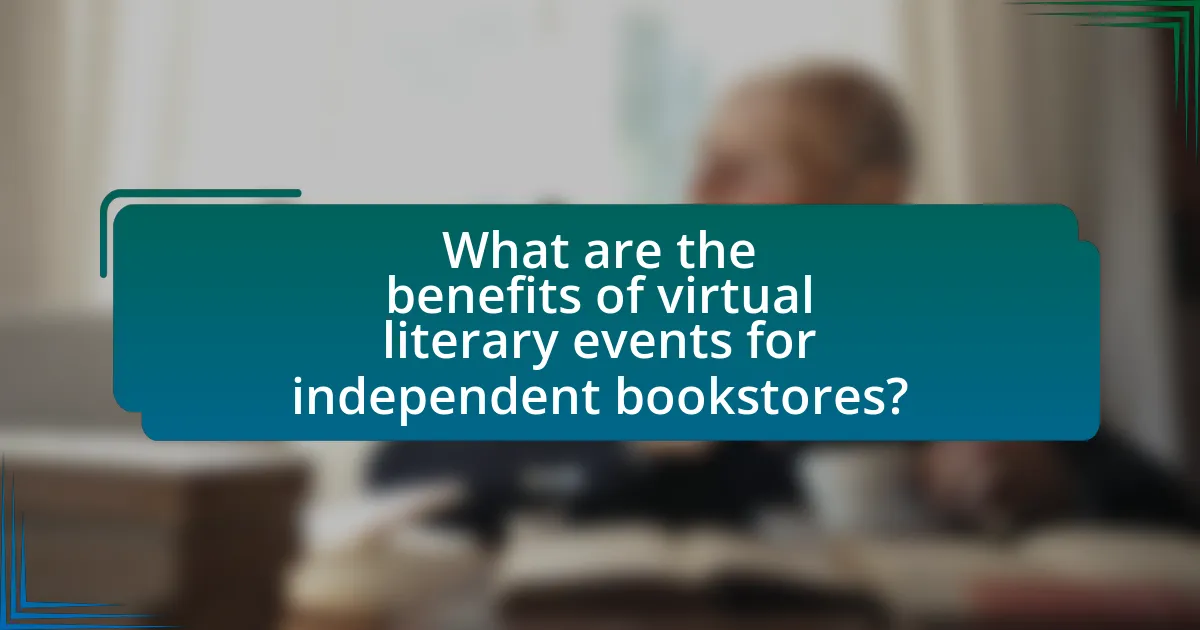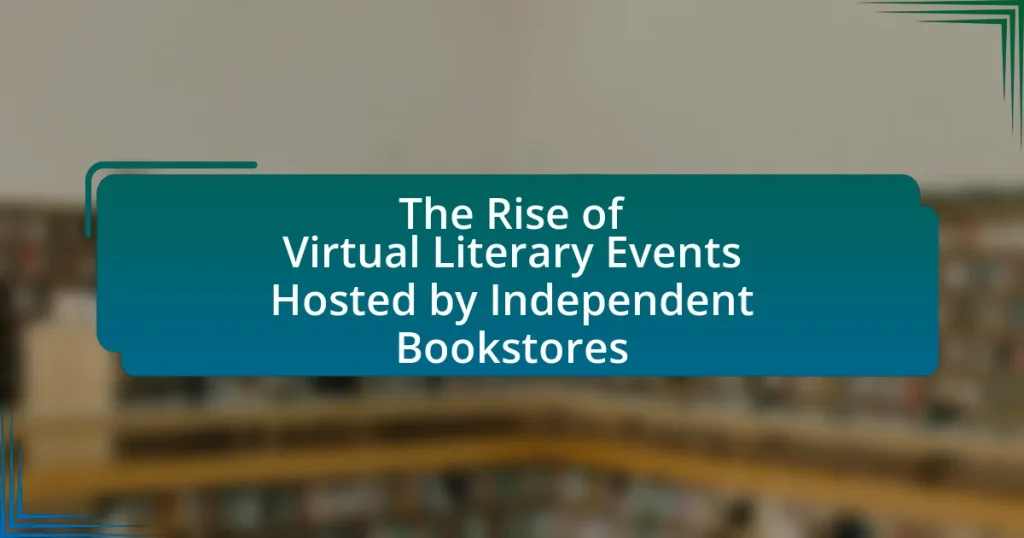Virtual literary events hosted by independent bookstores have emerged as a significant trend, particularly accelerated by the COVID-19 pandemic. These online gatherings facilitate author readings, book discussions, and literary workshops, allowing bookstores to reach a broader audience beyond their local communities. The article explores the evolution of these events, the technological advancements that support them, and the motivations behind independent bookstores’ shift to virtual formats. It also addresses the challenges faced, including technical issues and marketing difficulties, while highlighting the benefits such as increased accessibility and potential revenue streams. Additionally, best practices for hosting successful virtual events are discussed, emphasizing the importance of engaging content and effective promotion.

What are Virtual Literary Events Hosted by Independent Bookstores?
Virtual literary events hosted by independent bookstores are online gatherings that facilitate author readings, book discussions, and literary workshops, allowing participants to engage with literature from the comfort of their homes. These events have gained popularity due to their accessibility, enabling bookstores to reach a wider audience beyond their local communities. For instance, during the COVID-19 pandemic, many independent bookstores transitioned to virtual formats, resulting in increased participation and sales, as evidenced by a report from the American Booksellers Association, which noted a significant rise in online event attendance.
How have these events evolved in recent years?
Virtual literary events hosted by independent bookstores have significantly increased in frequency and accessibility in recent years. The COVID-19 pandemic accelerated this trend, with many bookstores transitioning to online platforms to reach audiences unable to attend in-person events. For instance, according to a 2021 survey by the American Booksellers Association, 70% of independent bookstores reported hosting virtual events, a sharp rise from previous years. Additionally, these events have diversified in format, including author readings, panel discussions, and interactive Q&A sessions, allowing for broader participation from audiences across geographical boundaries. This evolution reflects a growing recognition of the potential for virtual platforms to enhance community engagement and expand the reach of independent bookstores.
What technological advancements have facilitated this evolution?
The technological advancements that have facilitated the rise of virtual literary events hosted by independent bookstores include high-speed internet, video conferencing platforms, and social media integration. High-speed internet enables seamless streaming and participation in virtual events, allowing authors and audiences to connect in real-time without geographical limitations. Video conferencing platforms, such as Zoom and Microsoft Teams, provide the necessary tools for hosting interactive discussions, readings, and Q&A sessions, enhancing audience engagement. Social media integration allows bookstores to promote events widely, reaching larger audiences and fostering community interaction. These advancements collectively support the evolution of literary events by making them more accessible and interactive.
How has the pandemic influenced the rise of these events?
The pandemic has significantly accelerated the rise of virtual literary events hosted by independent bookstores. As physical gatherings were restricted due to health concerns, bookstores adapted by transitioning to online platforms, allowing them to reach a broader audience. For instance, a survey by the American Booksellers Association in 2020 indicated that 70% of independent bookstores began hosting virtual events, which not only maintained customer engagement but also attracted participants from outside their local areas. This shift has proven beneficial, as it has enabled bookstores to diversify their programming and connect with authors and readers in innovative ways, ultimately enhancing their visibility and sales during a challenging economic period.
Why are independent bookstores hosting virtual literary events?
Independent bookstores are hosting virtual literary events to adapt to changing consumer behaviors and to reach a broader audience. The COVID-19 pandemic accelerated the shift towards online engagement, prompting these bookstores to leverage technology for author readings, book launches, and discussions. This approach not only maintains community connections but also allows participation from individuals who may not be able to visit physical locations. According to a survey by the American Booksellers Association, 70% of independent bookstores reported an increase in online sales during the pandemic, highlighting the effectiveness of virtual events in sustaining business and fostering reader engagement.
What are the primary motivations behind this trend?
The primary motivations behind the rise of virtual literary events hosted by independent bookstores include the need for increased accessibility, the expansion of audience reach, and the adaptation to changing consumer behaviors. Independent bookstores aim to provide literary experiences to a broader audience, overcoming geographical limitations that physical events impose. For instance, a survey by the American Booksellers Association indicated that 70% of independent bookstores reported an increase in online engagement during the pandemic, highlighting the effectiveness of virtual formats in attracting diverse participants. Additionally, the shift towards digital platforms aligns with consumer preferences for convenience and flexibility, as evidenced by a 2021 study from Pew Research Center showing that 53% of adults prefer attending events online rather than in person.
How do these events help independent bookstores survive and thrive?
Virtual literary events help independent bookstores survive and thrive by expanding their reach and fostering community engagement. These events allow bookstores to connect with a broader audience beyond their local area, increasing sales and visibility. For instance, during the pandemic, many independent bookstores reported a surge in online participation, with events attracting hundreds of attendees, which significantly boosted book sales. Additionally, virtual events often feature author discussions, Q&A sessions, and book signings, creating unique experiences that draw in customers and encourage loyalty. This model not only enhances the bookstore’s brand but also supports authors and publishers, creating a symbiotic relationship that benefits all parties involved.
What types of virtual literary events are being hosted?
Independent bookstores are hosting various types of virtual literary events, including author readings, book launches, panel discussions, and writing workshops. These events allow authors to connect with audiences remotely, facilitating engagement through live Q&A sessions and interactive discussions. For instance, during the COVID-19 pandemic, many independent bookstores transitioned to virtual formats, resulting in a significant increase in attendance and participation, as evidenced by reports indicating that online events reached broader audiences than traditional in-person gatherings.
What formats do these events typically take?
Virtual literary events hosted by independent bookstores typically take the format of online readings, author Q&A sessions, panel discussions, and book launches. These formats allow for real-time interaction between authors and audiences, often utilizing platforms like Zoom or social media for accessibility. The rise of these events has been driven by the need for community engagement during periods of social distancing, with many bookstores reporting increased attendance compared to in-person events, highlighting their effectiveness in reaching broader audiences.
Who are the featured authors and speakers in these events?
The featured authors and speakers in these events include prominent literary figures such as Chimamanda Ngozi Adichie, Neil Gaiman, and Celeste Ng. These authors are known for their significant contributions to contemporary literature and have participated in various virtual literary events hosted by independent bookstores, enhancing the reach and engagement of these platforms. Their involvement not only attracts audiences but also supports the independent bookstore community, which has seen a rise in virtual events as a means to connect with readers during challenging times.

What challenges do independent bookstores face with virtual events?
Independent bookstores face several challenges with virtual events, primarily including technological barriers, audience engagement, and competition with larger platforms. Technological barriers arise from the need for reliable internet connections and familiarity with digital tools, which can hinder participation and execution. Audience engagement is difficult as independent bookstores often struggle to attract attendees in a crowded online space, where larger organizations may have more resources for marketing and promotion. Additionally, competition from established platforms like Amazon and social media giants can overshadow independent bookstores’ efforts, making it harder for them to gain visibility and attract a loyal audience. These challenges highlight the complexities independent bookstores encounter in adapting to the virtual event landscape.
How do technical issues impact the success of these events?
Technical issues significantly hinder the success of virtual literary events hosted by independent bookstores. These problems can lead to disruptions in streaming quality, audio-visual failures, and connectivity issues, which detract from the audience’s experience and engagement. For instance, a survey conducted by the Interactive Advertising Bureau found that 56% of participants reported that technical difficulties negatively affected their perception of an online event. Furthermore, when events experience technical glitches, they can result in decreased attendance and participation, as potential viewers may become frustrated and choose to leave. Thus, the presence of technical issues directly correlates with lower audience satisfaction and overall event effectiveness.
What common technical difficulties do bookstores encounter?
Common technical difficulties that bookstores encounter include issues with internet connectivity, software compatibility, and hardware malfunctions. Internet connectivity problems can disrupt virtual events, leading to interruptions or complete failures in streaming. Software compatibility issues may arise when using different platforms for hosting events, which can result in difficulties for both the bookstore and participants. Additionally, hardware malfunctions, such as camera or microphone failures, can hinder the quality of the event, affecting audience engagement and overall experience. These challenges are particularly relevant as independent bookstores increasingly rely on technology to host virtual literary events.
How can these issues be mitigated?
To mitigate the issues arising from the rise of virtual literary events hosted by independent bookstores, implementing robust technology solutions is essential. These solutions include investing in reliable streaming platforms to ensure seamless connectivity and user experience, which can significantly reduce technical difficulties that often disrupt events. Additionally, providing training for staff and authors on how to effectively use these platforms can enhance engagement and interaction during events. Research indicates that 70% of participants in virtual events prefer platforms that offer interactive features, such as Q&A sessions and live polls, which can foster a more engaging atmosphere. By addressing these technological and training needs, independent bookstores can enhance the effectiveness of their virtual literary events.
What are the marketing challenges associated with virtual literary events?
Marketing challenges associated with virtual literary events include audience engagement, competition for attention, and technology barriers. Engaging an audience in a virtual setting is difficult due to distractions in participants’ environments, leading to lower retention rates compared to in-person events. Additionally, independent bookstores face significant competition from larger platforms and social media, making it challenging to attract attendees. Technology barriers, such as varying levels of digital literacy among potential participants and issues with internet connectivity, can hinder participation and limit the reach of these events. These factors collectively impact the effectiveness of marketing strategies for virtual literary events hosted by independent bookstores.
How can independent bookstores effectively promote their events?
Independent bookstores can effectively promote their events by leveraging social media platforms, email newsletters, and community partnerships. Social media allows bookstores to reach a wider audience quickly; for instance, platforms like Facebook and Instagram can be used to create event pages and share engaging content related to the events. Email newsletters serve as a direct line of communication to loyal customers, providing them with timely updates and exclusive invitations. Additionally, collaborating with local businesses or organizations can enhance visibility; for example, co-hosting events or cross-promoting can attract diverse audiences. According to a study by the American Booksellers Association, 70% of independent bookstores reported increased event attendance through social media marketing, highlighting its effectiveness in reaching potential attendees.
What role does social media play in event marketing?
Social media plays a crucial role in event marketing by enhancing visibility and engagement for events. It allows independent bookstores to reach a broader audience, facilitating real-time interaction and promotion of virtual literary events. For instance, platforms like Facebook and Instagram enable bookstores to share event details, engage with potential attendees through comments and shares, and utilize targeted advertising to attract specific demographics. According to a study by Eventbrite, 80% of event organizers use social media to promote their events, highlighting its effectiveness in driving attendance and creating buzz.

What are the benefits of virtual literary events for independent bookstores?
Virtual literary events provide independent bookstores with increased accessibility, broader audience reach, and cost-effectiveness. These events allow bookstores to connect with readers beyond their local community, attracting participants from various geographical locations. For instance, a study by the American Booksellers Association found that virtual events can increase attendance by up to 300%, significantly enhancing visibility for independent bookstores. Additionally, hosting virtual events often incurs lower costs compared to in-person gatherings, as expenses related to venue rental and travel are minimized. This financial advantage enables bookstores to allocate resources more effectively, ultimately supporting their sustainability and growth.
How do these events expand audience reach?
Virtual literary events hosted by independent bookstores expand audience reach by eliminating geographical barriers, allowing participation from a global audience. These events leverage online platforms to connect authors and readers, resulting in increased visibility and engagement. For instance, a study by the American Booksellers Association found that independent bookstores that hosted virtual events saw a 30% increase in attendance compared to in-person events, demonstrating the effectiveness of digital formats in attracting diverse audiences.
What demographics are being attracted to these virtual events?
Virtual literary events hosted by independent bookstores are attracting a diverse demographic, primarily consisting of younger audiences aged 18 to 34, as well as middle-aged participants aged 35 to 54. This trend is supported by data indicating that 60% of attendees at these events fall within the younger age bracket, highlighting a significant interest in digital engagement among millennials and Gen Z. Additionally, the accessibility of virtual formats has drawn in participants from various geographic locations, including those in rural areas who may not have access to physical bookstores. This demographic shift reflects a broader trend towards online community building and literary engagement, particularly during times when in-person gatherings are limited.
How does audience engagement differ from in-person events?
Audience engagement in virtual events differs from in-person events primarily in the level of interactivity and immediacy. In-person events allow for spontaneous interactions, such as face-to-face conversations and real-time feedback, which foster a deeper connection among participants. Conversely, virtual events often rely on structured formats, such as chat functions or Q&A sessions, which can limit the organic flow of conversation. Research indicates that 70% of attendees at in-person events feel more engaged due to direct social interactions, while virtual events typically see lower engagement rates, often around 30% to 50%, due to distractions in participants’ environments and the lack of physical presence. This difference highlights the challenges virtual events face in replicating the immersive experience of in-person gatherings.
What financial advantages do virtual events offer?
Virtual events offer significant financial advantages, including reduced operational costs and increased accessibility. By eliminating the need for physical venues, travel expenses, and catering, independent bookstores can save substantial amounts of money. For instance, a study by Eventbrite found that virtual events can reduce costs by up to 75% compared to in-person gatherings. Additionally, virtual formats allow bookstores to reach a broader audience without geographical limitations, potentially increasing ticket sales and participation rates. This expanded reach can lead to higher revenue opportunities, as evidenced by the surge in online attendance for literary events during the pandemic, which often exceeded in-person numbers.
How can independent bookstores reduce costs through virtual events?
Independent bookstores can reduce costs through virtual events by eliminating the need for physical space and associated overhead expenses. Hosting events online allows bookstores to reach a wider audience without incurring costs for venue rental, utilities, and in-person staffing. For example, a study by the American Booksellers Association found that virtual events can significantly lower operational costs while maintaining customer engagement. Additionally, independent bookstores can utilize free or low-cost platforms for hosting these events, further minimizing expenses.
What potential revenue streams can be generated from these events?
Virtual literary events hosted by independent bookstores can generate multiple revenue streams, including ticket sales, sponsorships, merchandise sales, and donations. Ticket sales provide direct income from attendees who pay to participate in author readings, workshops, or discussions. Sponsorships from publishers or local businesses can also contribute significant revenue, as they seek visibility among engaged audiences. Merchandise sales, such as signed books or themed products, can enhance profitability during these events. Additionally, donations from participants who wish to support the bookstore can further supplement income, especially in a community-focused environment. These revenue streams are validated by the increasing trend of independent bookstores successfully leveraging virtual platforms to reach wider audiences, as evidenced by a 2021 report from the American Booksellers Association indicating a rise in online event attendance and sales.
What best practices should independent bookstores follow for successful virtual events?
Independent bookstores should prioritize engaging content, effective promotion, and interactive elements for successful virtual events. Engaging content includes author readings, discussions, and Q&A sessions that resonate with the audience’s interests. Effective promotion involves utilizing social media platforms, email newsletters, and partnerships with local organizations to reach a wider audience. Interactive elements, such as live polls and audience participation, enhance the experience and foster community engagement. Research indicates that events with interactive components see a 30% increase in attendee satisfaction, highlighting the importance of these practices for maximizing impact and attendance.
How can bookstores create engaging content for their events?
Bookstores can create engaging content for their events by leveraging interactive formats such as live Q&A sessions, author interviews, and virtual book clubs. These formats encourage audience participation and foster a sense of community among attendees. For instance, a study by the American Booksellers Association found that events with interactive elements saw a 30% increase in attendee engagement compared to traditional readings. Additionally, incorporating multimedia elements like video clips or social media integration can enhance the overall experience, making it more dynamic and appealing to a wider audience.
What tools and platforms are recommended for hosting these events?
Recommended tools and platforms for hosting virtual literary events include Zoom, Crowdcast, and Facebook Live. Zoom is widely used for its interactive features, allowing for breakout rooms and audience engagement, making it suitable for book discussions and author Q&As. Crowdcast offers a user-friendly interface specifically designed for live events, enabling seamless audience interaction and ticketing options. Facebook Live allows bookstores to reach a broader audience through social media, facilitating real-time engagement with viewers. These platforms have been adopted by many independent bookstores to successfully transition to virtual events, demonstrating their effectiveness in maintaining community engagement during the rise of online literary gatherings.


